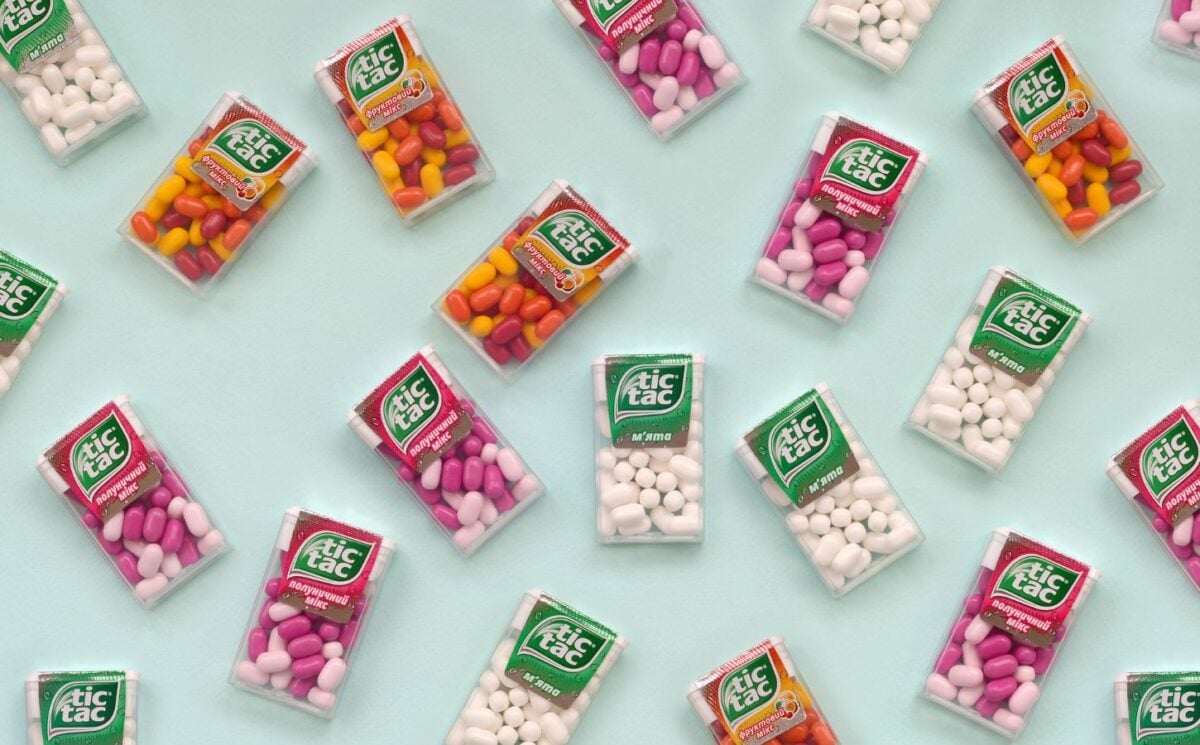Tic Tacs are some of the most iconic hard candies in the world. The small, pill-shaped mints come in a variety of different flavors and colors and are widely consumed. But are Tic Tacs vegan?
Read more: Vegan Celebrations-Style Selection Box Launches On Deliveroo
Tic Tacs are produced by the Italian company Ferrero, which is best known for its chocolate-based products Nutella and Ferrero Rocher. The confectioner first launched the brand in 1969 as “Refreshing Mints,” then updated the name to the onomatopoeic “Tic Tac” to reflect the sound of the mints rattling around inside their distinctive plastic container.
Ferrero introduced the orange flavor Tic Tacs as well as a mint-orange mix soon after, followed by sour apple, strawberry, pink grapefruit, and many others. In 2010 the company launched pomegranate flavor, and in 2014 introduced mango, lime, and popcorn flavors.
In the UK, the current roster includes Classic Fresh Mint, Fruit Adventure, Lime & Orange, Cherry Cola, Berry Bliss, Citrus Mix, and Cherry Lemonade.
As demand grows for plant-based foods, the vegan confectionery market, in particular, is moving from strength to strength. A report from earlier this year predicted that it could reach USD $2.9 billion by 2030, and noted that “nostalgia” played a key role in driving demand.
Tic Tacs certainly have a nostalgic appeal, but are they vegan? The answer depends on the flavor, recipe, and maybe your location. First, let’s talk about ingredients to watch out for.
Read more: Why Aren’t Haribo Vegan? Full List Of The Brand’s Plant-Based Sweets
What potential Tic Tac ingredients might not be vegan?

Vegan sweets are becoming more commonplace, but there are still lots of ingredients to look out for that might come from animals, including some with euphemistic or scientific names that aren’t immediately obvious as non-vegan foods.
Carmine, carminic acid, or E120, for example, all refer to a natural red food dye produced by grinding up cochineal insects. While there are many plant-based alternatives, carmine is still widely used in confectionery and other foodstuffs as it is typically the cheapest option.
Shellac is also insect-based. The natural resin has a huge number of applications, including everything from sealing fabric handlebar tape in place on bicycles to pre-vinyl gramophone records. Shellac also gives some candies their distinctively shiny finish.
Gelatine is also animal-based. It’s produced by boiling the body parts of cows, pigs, and other animals. It is widely used in confectionery and other products, though around 67 percent of British people are unaware of which ones.
Dairy is often used in creamy or chocolate-flavored candies, but it can also pop up in some extremely unexpected places. Milk powder can be incorporated as a flavor enhancer, a cheap bulking agent, or to fortify a recipe, so it’s always worth double-checking.
Are Tic Tacs vegan?
Some Tic Tacs are vegan, but many are not. Wherever you are in the world, Tic Tac ingredients are subject to change, so please always check the label before buying any Tic Tac product to look out for animal ingredients.
In the UK, at the time of writing, the Fresh Mint flavor does appear to be suitable for vegans, as it uses carnauba wax, which is plant-based. Cherry Cola is an example of a flavor that is not suitable for vegans, as it contains carminic acid. On the official Tic Tac website, the brand states that only Fresh Mint is suitable for vegetarians. In its assessment of Tic Tac, The Good Shopping Guide deducted points due to its lack of vegetarian certification, among other things.
The company has also previously said that it does not use rennet, another animal-derived ingredient, in any of its products, and that Tic Tac does not test on animals.
Read more: The Top 20 Most Vegan-Friendly Cities In The USA, According To New Report






